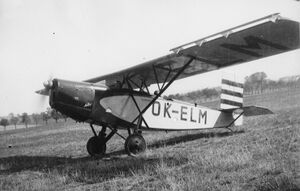Engineering:Letov Š-39
From HandWiki
The Letov Š-39 was a sport aircraft produced in Czechoslovakia during the 1930s. It was a conventional, parasol-wing monoplane with fixed tailskid undercarriage, and seating for the pilot and passenger in tandem, open cockpits. Because the cabane struts were very short, and the wing therefore placed very close to the top of the fuselage, the cockpits had the unusual arrangement of the passenger's being in front of the wing while the pilot's was behind it. The outer half of each wing was fitted with fixed slats along the leading edge. An initial batch of 23 machines was built for use by Czech aeroclubs. These were followed by batches of aircraft with alternative powerplants.
Variants
- Š-39
- Prototype with Orion LL-50 engine followed by production batch with Walter Polaris engines
- Š-139
- Production model with Pobjoy R engine and Townend ring
- Š-239
- Production model with Walter Minor 4 engine
Specifications (Š-39)
General characteristics
- Crew: One pilot
- Capacity: 1 passenger
- Length: 6.14 m (20 ft 2 in)
- Wingspan: 10.00 m (32 ft 10 in)
- Wing area: 14.0 m2 (151 sq ft)
- Empty weight: 315 kg (693 lb)
- Gross weight: 515 kg (1,133 lb)
- Powerplant: 1 × Walter Polaris , 41 kW (55 hp)
Performance
- Maximum speed: 150 km/h (94 mph, 82 kn)
- Range: 480 km (300 mi, 260 nmi)
- Service ceiling: 3,300 m (10,800 ft)
- Rate of climb: 2.1 m/s (410 ft/min)
References
- Taylor, Michael J. H. (1989). Jane's Encyclopedia of Aviation. London: Studio Editions. pp. 573.
- Němeček, Václav (1968). Československá letadla. Prague: Naše Vojsko.
 |




